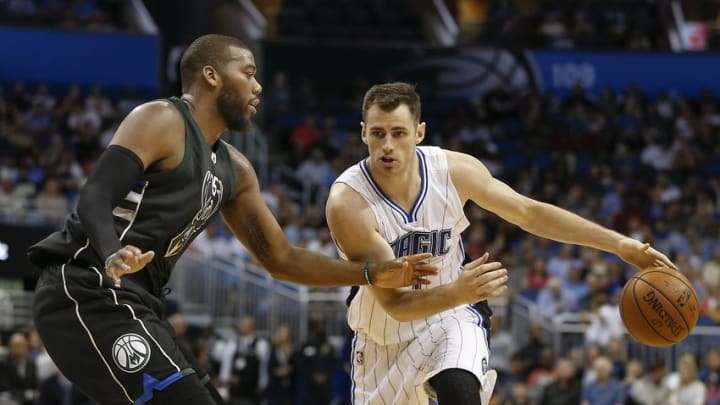
The Good and the Bad
| Season | G | GS | MP | FG% | 3P% | eFG% | FT% | ORB | DRB | TRB | AST | STL | BLK | TOV | PF | PTS |
|---|---|---|---|---|---|---|---|---|---|---|---|---|---|---|---|---|
| 2015-16 | 76 | 2 | 15.5 | .485 | .250 | .489 | .806 | 0.7 | 2.2 | 2.9 | 0.8 | 0.4 | 0.9 | 0.8 | 2.1 | 7.2 |
Provided by Basketball-Reference.com: View Original Table
Generated 5/2/2016.
Outside of hitting mid-range jumpers and showing veteran leadership, little was expected from Jason Smith. But he more than exceeded his expected contribution.
Throughout the season, Smith was a solid and consistent offensive presence, averaging 7.2 points per game while shooting the ball well.
He shot 48.5 percent from the field, including a career-high 57.4 percent from between 10 and 16 feet, allowing him to stretch the floor on a Magic team that are certainly lacking in quality shooters.
His mid-range jumper also turned into a weapon itself for Orlando, often being a go-too option to bail the team out in late-shot-clock situations when the offense became stagnant, which it often did.
Where Smith surprised the most however was on the defensive end. The 30-year-old veteran showed himself to be a good team defender, taking to Scott Skiles‘ defensive scheme like a duck to water. He also, at times, began to look something like a rim protector, pulling off some spectacular blocks and being more of a presence at the rim than some other Magic big men, notably starting center Nikola Vucevic.
One under-appreciated quality he brought to the team was his on-court leadership, which sometimes saw him take on the “bruiser” role for the team. While this sometimes may have gone too far — such as during his clash with Nerlens Noel in the Magic’s early season 105-97 victory over the Philadelphia 76ers — it certainly aided a Magic team that have sometimes had questionable fight in the past few seasons.
That said, the big man’s season was, as previously mentioned, far from perfect. Smith saw greater minutes following the injury to Vucevic, and his game began to become more and more exposed.
Although a decent scorer, he did sometimes fall a bit too much in love with his shot, having a usage rate of 22.1 percent – this is only marginally lower than the team’s second leading scorer, Victor Oladipo.
Playing greater minutes also increasingly exposed Smith’s two biggest weaknesses — his lack of an extensive offensive game, and his rebounding.
Smith lacks a dynamic offensive repertoire. Aside from being one of the league’s best jump-shooting big men, he possess very little in his offensive arsenal. He is not comfortable taking it to the basket and has a tendency to rush when finishing. And he completely lacks a post-up game, shooting just 45.0 percent in post-up situations.
His other major weakness is rebounding, and the journeyman averaged just 2.9 boards per contest. His rebounding rate was far below that of any other Magic big man, aside from Andrew Nicholson, being just 10.3 percent. For comparison, fellow center Dewayne Dedmon had a rebounding rate of 17.9 percent on the season.
Finally, while Smith is not a terrible individual defender, he lacks the foot speed to consistently guard the pick-and-roll well, although he does a better job of hedging than Vucevic. This is mainly due to athletic limitations as opposed to a question of effort.
Next: Best Game of 2016
